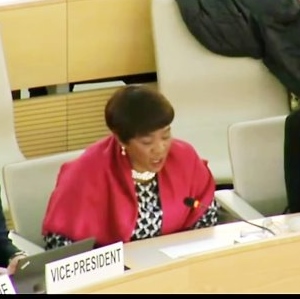
SA

Hypocrisy as South African ambassador compares Israel to apartheid
TALI FEINBERG
Her statement, representing the South African government, was made in the context of 54 African states issuing a strong condemnation of Israel and reaffirming their support for “the historic fight of the Palestinian people to realise the right to freedom”.
Specifically, Mxakato-Diseko compared the following to apartheid: “That the occupied Palestinian Territories are under belligerent occupation; ongoing practices of detention without legitimate grounds of legal basis; unlawful administrative detention practices; violations of due processes guaranteed in criminal proceedings, including acquisition of evidence under pressure or duress; the arbitrary detention of hundreds of Palestinian children and the undermining of freedoms of expression; and settlement construction, expansion and consolidation.”
Said SA Zionist Federation chairman Ben Swartz: “This approach makes it clearly apparent how uninformed and ignorant the ANC has become in their knowledge of the conflict. This narrative is so far from the truth, it’s astounding. With this kind of simplistic understanding, the ANC will never be able to contribute an ounce in helping the differing sides to the conflict to achieve a long-term resolution.
“Yes, there is a complex situation of a military occupation in the West Bank, but it is not apartheid. Until the two sides come to the table to resolve the impasse, this status quo will prevail. The application of the definition of apartheid is a lie.
“The South African government’s view of the situation is one of the most hard-line and radical positions on the face of the planet, and it’s not helping the Palestinians. It is a very destructive position to take and it pulls the parties to the conflict further apart, not together.
“As Chief Rabbi Dr Warren Goldstein says: ‘If everything is apartheid, nothing is apartheid.’ We as South Africans should know the difference. Meanwhile, almost every other Middle Eastern country practises ‘apartheid’ against its civilians, whether through the denying of rights to society, minorities, religion or women,” concludes Swartz.
Indeed, Mxakato-Diseko’s comments demonstrate her own hypocrisy. In 2016, “she led South Africa to abstain from backing a resolution at the UNHRC in support of gay rights, which is odd, considering that our Constitution explicitly bans discrimination on grounds of sexuality”, reported Times LIVE.
The resolution, which did pass, established an independent expert on protection against violence and discrimination based on sexual orientation and gender identity, yet Mxakato-Diseko held back South Africa’s support. Before the official vote, she said that the resolution was too divisive, unnecessary, and an “arrogant approach”.
Matthew Clayton, the research, advocacy and policy manager for the Triangle Project – a gay human rights organisation in South Africa – told Times LIVE that he felt that the abstention went against the constitutional provisions and state agreements, such as the Ekurhuleni Declaration, which states: “State and non-state actors must desist from perpetrating, promoting, condoning and ignoring violence and discrimination against any person on any basis, including sexual orientation, gender identity and expression. State and non-state actors have been, and continue to be, complicit in violence and discrimination directly or indirectly, through omission and commission.”
Says Wendy Kahn, national director of the SA Jewish Board of Deputies (SAJBD): “Mxakato-Diseko’s utterances [about Israel] are in direct contradiction to a comment made by department of international relations and co-operation spokesperson Clayson Monyela to the Daily Maverick, in which he was defending South Africa’s inaction regarding its participation in a special consultation regarding Syria.”
Monyela explained to the Daily Maverick that “government’s policy in the UN [is] to abstain on country-specific situations outside the African continent in order not to align South Africa with any particular geopolitical bloc, and to ensure that we retain our ability to adopt independent policy positions in multilateral forums”.
Yet UN Watch says that South Africa “often sides with the majority of dictatorships”, because at the UN General Assembly, South Africa has abstained three times from resolutions condemning Syria’s human rights abuses, and once from a resolution condemning human rights abuses in North Korea. South Africa also voted against two resolutions condemning Iran’s human rights abuses.
From the SAJBD’s perspective, says Kahn, “it is regrettable that, once again, South Africa has used an important multilateral platform to voice unhelpful and untrue catchphrases that make no contribution to addressing the serious crisis between the Palestinians and Israelis.
“Sadly, all that these simplistic slogans achieve is to further polarise the parties, pushing a negotiated resolution further and further away. We believe that South Africa is uniquely placed to assist with peace building by sharing our successful history in negotiation.
“But South Africa undermines its role with these divisive, one-sided and populist statements.”





Jessica
April 3, 2018 at 2:12 pm
‘The more things change, the more they stay the same. Any hope that Ramaphosa’s presidency would be more democratic is fading fast.
With Bolshevik apparatchiks like this so called "ambassador" calling the shots, the BDS mafias at our universities would be extremely pleased and encouraged to continue with their hidden anti-Semitic agenda. ‘